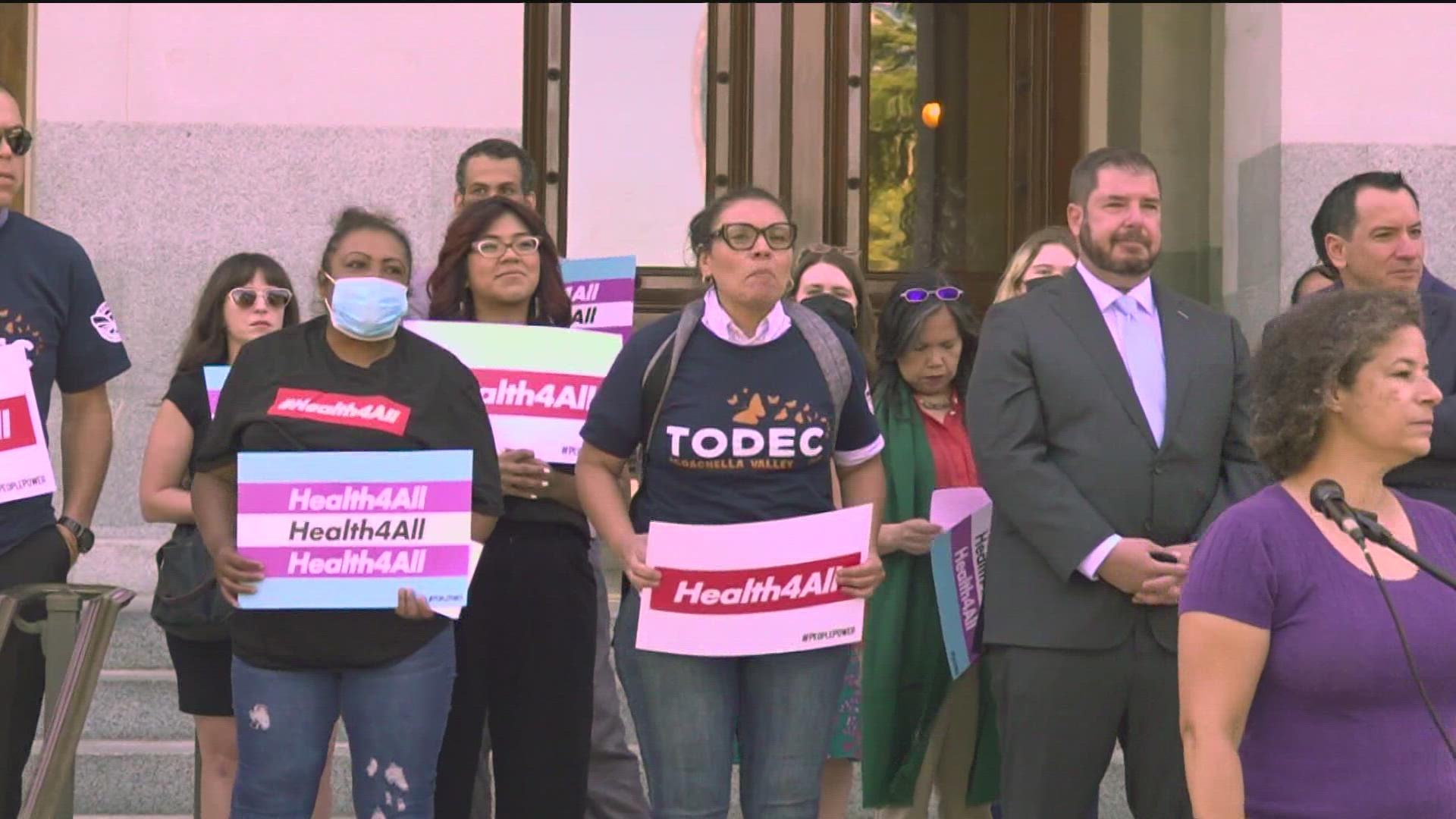CALIFORNIA, USA —
The new state budget announced by Governor Gavin Newsom includes plans to expand Medi-Cal coverage to more undocumented Californians.
The new expansion will include those ages 26 to 49 and is expected to begin no later than Jan. 1, 2024. The expansion is predicted to cost $2.6 billion annually. Health advocates said about 700,000 more people will now qualify for the program – the largest group of undocumented residents in the state.
Floricel Liborio is an undocumented immigrant and activist who has lived in California for decades. She was overjoyed to hear the news that she would qualify for Medi-Cal after years without health insurance.
“(I) will be able to have medical services (and) checkups on time,” Liborio said.
Liborio said she was diagnosed with gallstones, but because of her immigration status, she was unable to receive the medical care that she needed.
“I’ve gone with extreme pain and have been denied because I don’t qualify,” Liborio said. “...after hearing (the) news, I was very excited because, possibly, I will be able to get the surgery I have needed for a long time."
Jose Torres Casillas, the policy and legislative advocate for Health Access California, said that limiting access to health care for undocumented Californians has forced many people to rely on home remedies or community clinics, which do not always have the full capacity to meet patients' needs.
Health advocates said expanding Medi-Cal to more undocumented immigrants is a big win for the state. Undocumented Californians currently make up the largest group of the uninsured, according to researchers at the UC Berkeley Labor Center and the UCLA Center for Health Policy Research.
“Here in California, we've been working for many, many years to make our Medi-Cal program more inclusive,” said Sarah Dar, the director of health & public benefits policy at the California Immigrant Policy Center.
Casillas and Dar are part of the Health4All coalition comprised of over 180 organizations that are committed to health and racial justice. For nearly 10 years, the coalition has helped lead legislative and grassroots efforts to ensure there is full-scope Medi-Cal coverage for all low-income Californians, regardless of immigration status.
“We’ve worked to expand (Medi-Cal) coverage piece by piece,” Casillas said.
The state currently extends Medi-Cal eligibility to undocumented children, young adults and seniors.
The latest expansion of Medi-Cal means California will become the first state to remove immigration status as a barrier to health care for all income-qualifying undocumented residents. For now, the income cap for a family of four, for example, is roughly $36,000.
“This is a historic moment,” Casillas said. “As long as they qualify for Medi-Cal, they will be able to get preventative care, to get access to seeing a dentist, access to seeing an optometrist, access to just a regular doctor and having their various health concerns addressed.”
Dar said this sets a precedent for the rest of the country.
“If the leaders at the state level and the advocates in the communities want to do it, if there's the will, there's absolutely a way,” Dar said.
This is also something that a strong majority of Californians wanted. In 2021, 66% of California residents supported health care coverage for undocumented immigrants, according to a Public Policy Institute of California Statewide Survey.
"It's really just an issue of equity and justice and fairness for them to have the same things that everyone else around them (has), and (it) makes our state stronger," Dar said.
Liborio said health insurance will open many doors for her and other undocumented people to address their healthcare needs.
“All humans have a right to have services, not just because we are undocumented, we should be turned away. We should all have coverage,” Liborio said.
Organizations at the Capitol Wednesday called the expansion a win, but earlier this year, they were all fighting for universal health care, a single payer system. It did not get enough support to bring up for a vote on the Assembly floor, but organizers said its a fight they are not giving up on.
► Get more stories about race and culture: Sign up for our newsletter at www.abc10.com/email and find more online in our Race & Culture section.
WATCH ALSO:

